Every bite takes you home
Breaking down cultural barriers through breaking bread has long been the backbone for embracing migrants and refugees to Australia.
This idea of foods’ ability to unite people is explored in a new cookbook that shares the journey of sixteen asylum seekers who now call Australia home.
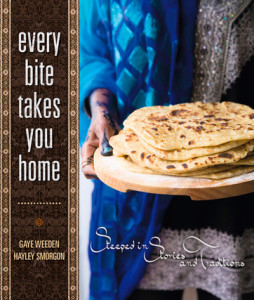
Every Bite Takes You Home invites us to share in the journeys of sixteen remarkable asylum seekers who have found a home in Australia
Every Bite Takes You Home tells each contributor’s unique story, their most cherished recipes, and food traditions from their homeland.
The book provides a platform for the contributors to share their stories of courage and remarkable resilience, as well as a window into meaningful food traditions from across the globe.
From Tibetan Momos to Kaffir Prawn Curry from Sri Lanka, the images and recipes will inspire the senses and imagination.
Alwal, one of the cooks featured in the book, believes the significance of food can’t be underestimated.
“Food is love,” said Alwal.
“Cooking makes me happy; I’m always talking and smiling while I’m cooking.”
Alwal arrived in Australia in 2003, after being forced to flee her home of Sudan for being Christian.
While Sudanese Christians were allowed to go to church, it was very difficult to celebrate and often people were kidnapped and forced to either pray to a different God or otherwise be executed.
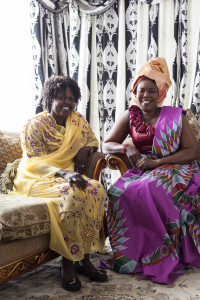
Alwal arrived in Australia after fleeing Sudan
When Alwal first moved to Dandenong she remembers how quiet the area was and how she was one of the first Sudanese Christians to move to the area.
Now the community is flourishing and Alwal works to help settle new Sudanese arrivals.
Cooking is a huge part of Alwal and her culture, with her whole community, around 500 people, gathering three to four times a year to celebrate through food.
Alwal, who has five children aged between one and eighteen, sees food as an essential part of maintaining traditions.
“At around seven the girls in my culture must wash up, and at twelve they learn to cook,” said Alwal.
“Food has been one of the most important ways of teaching my children about our culture.”
One of Alwal’s favourite things about her new home is the shared love for eating and enthusiasm for experiencing different foods.
“Here in Melbourne, everyone loves food. People in Melbourne want to enjoy food from all over the world,” said Alwal.
One of Alwal’s recipes that she shares in Every Bite Takes You Home is Geema, an authentic Sudanese stew rich in colour and flavour.
Beef Stew {Geema}
Serves 4
3 potatoes, peeled and diced
2 carrots, peeled and diced
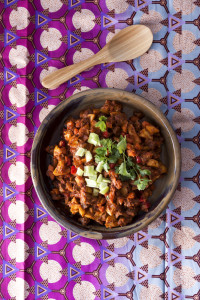
Geema
½ red capsicum, diced
1 onion, diced
250g beef, finely chopped
2 cloves garlic, minced
1 teaspoon dried dill
Pinch of black pepper
1 cinnamon stick
1 long red chilli, diced
⅔ cup (165ml) chicken stock
1 cup tomato paste
Vegetable oil, for frying
To make Geema
Cover the base of a large frying pan with oil, heat, then add the potatoes and fry until golden on all sides. Set aside.
Add extra oil to the pan if required and fry the carrots until soft. Set aside.
Fry the capsicum in the same oil, then set aside.
Add enough oil to fry the onion until golden. Add the beef and stir until browned. Add the garlic, dill, pepper, cinnamon stick, chilli, and stock, and cook until most of the water has been absorbed. Add the tomato paste and stir to combine. Cook on a low heat, covered, for a further 30 minutes until all the flavours have infused.
Add the fried vegetables and combine.
Serve.
Kalyan Ky, another contributor to the book, shares Alwal’s love of cooking and its ability to bring people together.
“I love how it makes you happy and connects you to the wider community. It’s a thread,” said Kalyan.
Kalyan was born in a Cambodian refugee camp in Thailand on the Thai-Cambodia border after her parents fled Cambodia.
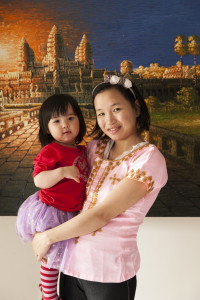
Kalyan was born in a Cambodian refugee camp
Even though the Pol Pot regime by that point was officially over, Cambodia was still an unsafe place to be in during the late 1980’s.
“It wasn’t just the Khmer Rouge, the Khmer Rouge affected everyone, but there was also the protracted war. It was difficult being Chinese-Cambodian,” said Kalyan.
When she was six months old her family was moved to Malaysia, where they spent three years in various refugee camps before being some of the ‘lucky ones’ to receive church sponsorship to live in New Zealand.
After living in New Zealand for fifteen years Kaylan moved to Australia in 2005 and has become a prominent figure within her community.
She is the chairwoman of the Ethnic Youth Council and works on the Angkor Gateway, a global initiative to preserve and promote Cambodia and its culture, as well as working with the Cambodia Australia Chamber of Commerce, Innovation and Industry.
Kaylan views Every Bite Takes You Home as a way to show the positive contributions refugees offer to the wider community and an opportunity to share their journeys.
“Projects like the cookbook are crucial because it give us refugees a voice, a sense of importance,” said Kaylan.
Through learning about individuals, readers will become more open to understanding other cultures.
“Not every refugee is going to be a model citizen, but the media covers only negative and extremist representations.”
Kaylan believes that there needs to be more support in Australia for helping refugees adjust in their new homes.
“Giving a voice to refugees highlights the need to assist not just refugee programs, but also resettlement programs,” said Kaylan.
“If they have access to resources such as knowing how to get a license, or other seemingly basic skills and information, they can become productive members of society.”
“People need to recognise that refugees are still human beings.”
Kaylan’s favourite dish, along with several others, is a tasty fried fish with a spicy tamarind sauce.
Fried Fish with Three Flavour Chilli Sauce
Serves 4
Fish
1 kg small snapper or any other fish
2 teaspoons salt
3 tablespoons cornflour
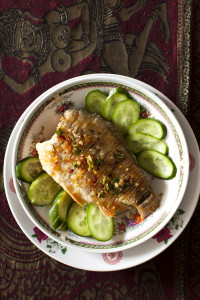
Fried fish with three flavour chilli sauce
4 cups (1 litre) vegetable oil, for deep frying
Sauce
2 cloves garlic, finely chopped
2–4 chilli peppers, ground
2 tablespoons fish sauce
1 tablespoon tamarind paste
2½ tablespoons sugar
Garnish
Crispy basil and coriander leaves, finely chopped, and cucumber slices
To make the dish
Preparing the fish:
While still raw, create 4 diagonal slashes across both sides of the fish and season with salt. Coat the fish with cornflour, removing excess pieces. Deep fry the fish until crispy and golden. Drain the oil using kitchen paper or a drainer and place on flat plate.
Preparing the sauce:
Heat approximately 1 tablespoon of oil and fry the garlic until brown. Add the ground chilli peppers, fish sauce, tamarind paste, and sugar, and heat until boiling.
Preparing the dish:
Pour the sauce over the fish. Garnish with the basil and coriander leaves.
Serve with the sliced cucumber.
The strikingly colourful images of the food and contributors that fill the cookbook strengthen the connection the reader has to the stories and recipes.
One such image is of Abshiro Farah, whose hands and chapattis appear on the front cover, her arm painted with blue ink in traditional intricate designs.
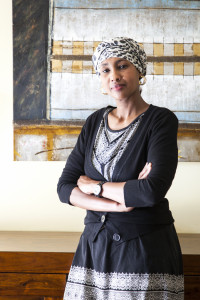
Abshiro fled the Civil War in Somalia
Abshiro was forced to flee the Civil War in Somalia when she was twenty, leaving her mother behind who then died due to the war.
She lived in Kenya for several years before being granted an Australian marriage visa to join her husband who had moved to Melbourne a few years earlier.
“When we have peace, we are certain. Now we are here (in Australia), we have peace. But still back home there is no peace, only hope,” said Abshiro.
Abshiro has had the opportunity to explore her love of cooking in Melbourne as a part of The Somali Kitchen, a group who have a blog and a cult following throughout the country.
“Food is my passion. Food engages peoples together. No matter where you come from, food brings people together and share each others stories. Everyone from every culture has a story to tell,” said Abshiro.
Abshiro’s culture is like many in that food is the absolute first priority for celebrating anything, from an engagement to the weekly coming together of family.
“Food is a huge part of keeping relationships with friends and family. We come together for Ramadan, for weekly feast together. We share our life over food,” said Abshiro.
“Teaching our food traditions and how to cook, as well as speaking our language at home, is how I make sure my children know their culture.”
Abshiro has brought her passion for educating children into her professional life, having obtained a Diploma in Children’s Services and now working in child care.
“Children are tomorrow’s future; no matter where we come from we must work hard to make sure they have a good future.”
Abshiro has taught her children to make a traditional baked chicken, a simple dish with an inviting aroma of spices.
Spicy Baked Chicken
Serves 4
1 kg chicken drummettes
½ teaspoon ground black pepper
½ teaspoon ground coriander
1 teaspoon ground cumin
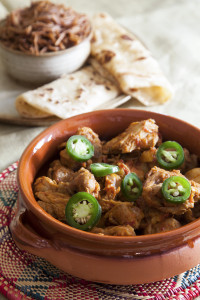
Spicy baked chicken
½ teaspoon ground cinnamon
½ teaspoon chilli powder (optional)
A few strands of saffron
Salt, to taste
Juice of 1 lemon
3 tablespoons olive oil
Green chilli, thinly sliced, to garnish
To make the dish
Preheat the oven to 180°C. Wash the chicken drummettes thoroughly and dry with paper towel. Prick the chicken with a sharp knife, which will allow the marinade to soak in nicely.
Mix all the spices with the salt, lemon juice, and olive oil. Add the chicken to the mixture and marinate for at least 30 minutes. (Marinate overnight if you have the time.)
Place the chicken on a baking tray lined with aluminium foil and bake in the oven for 35–45 minutes or until well browned. The cooking time depends on the size of your chicken drummettes.
Remove the drummettes from the oven and place in a serving dish.
Garnish with the green chilli slices.
Cooking and eating not only help to educate but can also be cathartic for those whose memories of food are connected to lost family, friends and places.
Food transcends language and experience, transforms perspective, and open minds and taste buds.
By sharing cultures through food, such as in Every Bite Takes You Home, a mutual appreciation of Australia’s shared cultural landscape will ensue.
Every Bite Takes You Home is available online and in all good book stores, with all profits going to asylum seeker support centres and organisations.
Ruby Brown
AMES Australia Staff Writer












